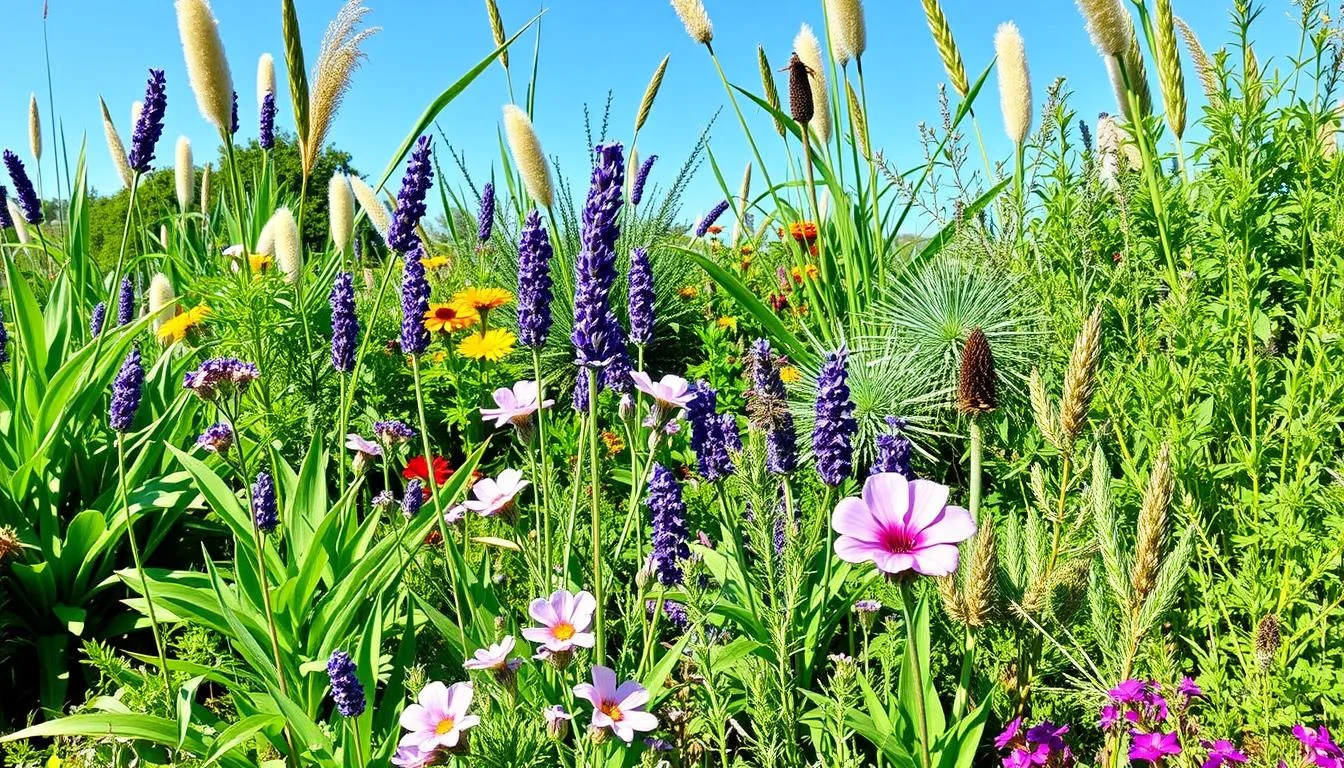Rabbit Resistant Plants: Top Options for Your Garden
Gardening fans often struggle to keep their plants safe from hungry rabbits. These animals can quickly ruin a beautiful garden. Luckily, there are many rabbit resistant plants that can protect your garden. By adding these plants, you can make a space where rabbits don’t want to be. This lets your favorite plants grow without worry.
Key Takeaways
- Discover a wide range of rabbit resistant plants to protect your garden
- Learn about the unique characteristics that make certain plants unappealing to rabbits
- Explore the benefits of incorporating rabbit resistant plants into your landscape
- Understand the importance of creating a rabbit-proof garden environment
- Gain valuable insights to help you select and care for rabbit resistant plants
Understanding Why Rabbits Target Garden Plants
Gardeners often face a battle with rabbits in their yards. These pests can damage even the most carefully chosen pest resistant vegetation. Knowing why rabbits like certain plants is key to keeping them away.
Rabbit Feeding Habits and Patterns
Rabbits love tender, young plants full of nutrients. They eat most in the early morning and evening. This makes them a big threat to your garden.
Identifying Rabbit Damage in Your Garden
Spotting rabbit damage is important for gardeners. Look for clean cuts on stems and small droppings around plants. This helps you know where to stop them.
Peak Seasons for Rabbit Activity
- Spring: Rabbits love new shoots and seedlings.
- Fall: They seek out plants to get ready for winter.
- Winter: They eat bark and twigs, damaging shrubs and trees.
Knowing when rabbits are most active helps gardeners protect their pest resistant vegetation. This way, you can keep your garden healthy and free from pests.
Benefits of Growing Rabbit Resistant Plants
Gardeners wanting a simple garden or organic pest control can benefit from rabbit resistant plants. These plants are tough and make gardening easier. They help create a healthier garden.
These plants keep rabbits away without using harmful chemicals. They have strong smells, coarse textures, or are toxic. This way, gardeners can establish an organic pest control system to protect their plants.
Rabbit resistant plants also need less care than other plants. They handle drought and changing weather better. This means less time watering, pruning, and other gardening tasks. They are perfect for those who want a low maintenance landscaping approach.
“Incorporating rabbit resistant plants into your garden is a smart, sustainable way to safeguard your plants and minimize the time spent on maintenance.”
Choosing rabbit resistant plants lets gardeners enjoy their outdoor spaces more. They spend less time fighting rabbits. This means more time for fun gardening activities like trying new plants and designs.
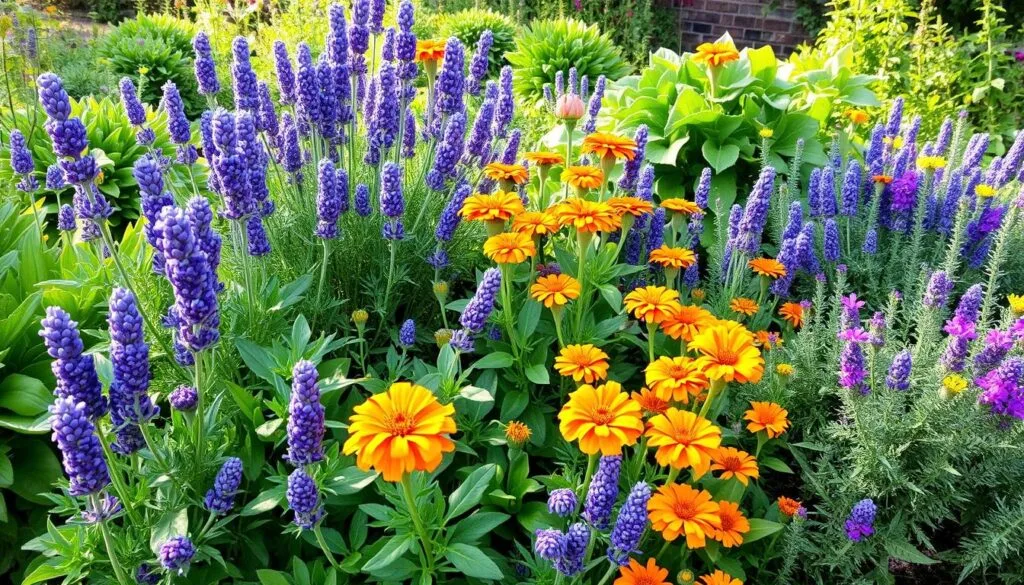
| Benefit | Description |
|---|---|
| Organic Pest Control | Rabbit resistant plants deter herbivorous pests without the need for harmful chemicals. |
| Low Maintenance Landscaping | These resilient plants require less time and effort for watering, pruning, and other routine tasks. |
| Sustainable Gardening | Rabbit resistant plants promote a healthier, more balanced ecosystem in the garden. |
Essential Characteristics of Rabbit Resistant Plants
Creating a garden that rabbits don’t like involves knowing the right plants. Some plants are less appealing to rabbits because of their characteristics. This knowledge helps gardeners choose the best plants for a rabbit-resistant garden.
Aromatic Properties
Many plants that keep rabbits away have strong smells. These smells, from essential oils, are unpleasant for rabbits. Plants like lavender, rosemary, and marigolds are good examples. They also keep deer away.
Physical Deterrents
Some plants have features that stop rabbits from getting to them. Plants with thorns or tough leaves are hard for rabbits to eat. Barberry and yucca are examples that also keep deer away.
Toxic or Bitter Components
Some plants are bad for rabbits because they’re toxic or taste bad. Daffodils, foxglove, and castor bean are examples. These plants can keep rabbits away but should be safe from pets and kids.
Knowing what makes some plants unappealing to rabbits helps gardeners. A mix of plants with strong smells, physical barriers, and toxic compounds can protect a garden. This way, gardeners can enjoy a beautiful garden even with rabbits around.
| Characteristic | Examples of Rabbit Resistant Plants | Additional Benefits |
|---|---|---|
| Aromatic Properties | Lavender, Rosemary, Marigolds | Also help repel deer |
| Physical Deterrents | Barberry, Yucca | Thorns and tough leaves make plants less accessible |
| Toxic or Bitter Components | Daffodils, Foxglove, Castor Bean | Compounds can be harmful or unpalatable to rabbits |
Top Flowering Plants That Rabbits Avoid
Protecting your garden from rabbits can be easy with the right plants. Some flowers are not appealing to rabbits, making your garden vibrant and safe. Let’s look at some top choices that rabbits usually avoid.
Marigold flowers are a great pick. They have a smell that rabbits don’t like. Lavender is also good, as its scent keeps rabbits away. The daffodil is another choice, with its unique shape and strong smell.
Zinnia and cosmos flowers add color and smell bad to rabbits. The peony is also good, with big flowers and leaves that rabbits can’t easily reach.
Foxglove and snapdragon are great for height. They are tall and have smells that are bad for rabbits. This keeps them from eating these plants.
Using a mix of these plants makes your garden beautiful and safe. It will stay this way for many years.
| Flowering Plant | Rabbit Resistance | Key Characteristics |
|---|---|---|
| Marigold | High | Strong fragrance, contains compounds rabbits dislike |
| Lavender | High | Aromatic, helps repel rabbits with its scent |
| Daffodil | High | Distinctive trumpet-shaped blooms, generally unappealing to rabbits |
| Zinnia | Moderate | Bright, pungent flowers that rabbits tend to avoid |
| Peony | High | Large, lush flowers with dense foliage that deters rabbits |
| Foxglove | High | Tall, striking flowers containing toxic compounds for rabbits |
| Snapdragon | High | Unique, tall blooms that rabbits typically steer clear of |
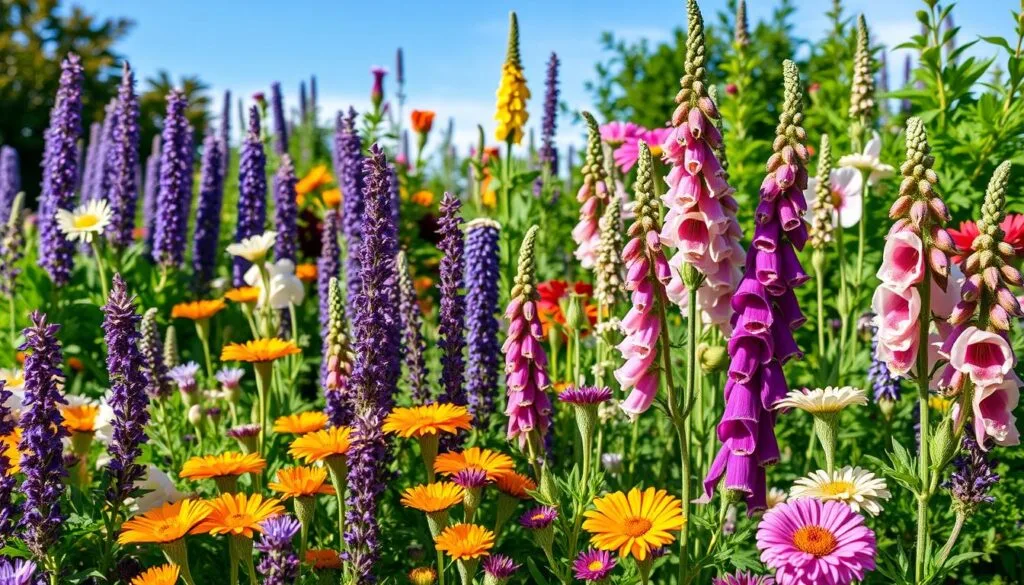
“Incorporating a diverse array of rabbit-resistant flowering plants is the key to creating a beautiful, well-protected garden that will thrive for years to come.”
Herb Garden: Natural Rabbit Deterrent Options
Protecting your garden from rabbits can be easy with an herb garden. Some herbs have natural properties that keep rabbits away. They are great for organic pest control.
Mediterranean Herbs
Mediterranean herbs like lavender, rosemary, and thyme have strong scents. Rabbits don’t like these smells. Place these herbs around your garden to keep rabbits out.
These herbs grow well and last long. They are perfect for keeping rabbits away for good.
Culinary Herbs That Repel Rabbits
- Chives and garlic taste great in food and keep rabbits away. Their strong smells are not appealing to rabbits.
- Sage and oregano are also good for your garden. Rabbits don’t like these herbs, making them a natural pest control.
Medicinal Herbs with Protective Properties
Herbs like yarrow and echinacea are good for health. They also keep rabbits away. Adding these herbs to your garden helps protect it from rabbits.
Using different herbs that rabbits don’t like can make your garden better. It will be easy to care for and full of fresh herbs for cooking.
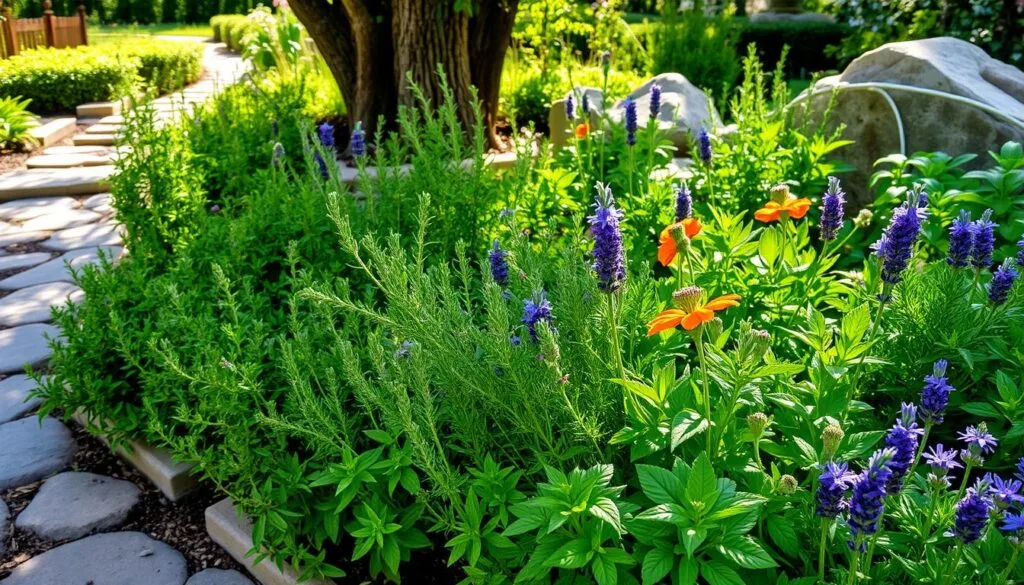
Shrubs and Perennials for Long-Term Protection
Shrubs and perennials are great for a pest resistant vegetation garden. They look good all year and keep rabbits away. These plants are easy to care for and keep your garden rabbit-free for a long time.
Boxwood is a good choice because it’s dense and keeps rabbits out. Forsythia is also great, with its bright yellow flowers and prickly branches that rabbits don’t like.
- Russian Sage: This shrub has leaves that rabbits don’t like, making it perfect for your garden.
- Lavender: Its purple flowers smell nice and keep rabbits away with their strong scent.
- Catmint: Cats love it, but rabbits don’t because of its minty smell and fuzzy leaves.
Using these low maintenance landscaping plants, your garden will stay beautiful and rabbit-free for years. These plants are easy to care for and make your garden a peaceful place.
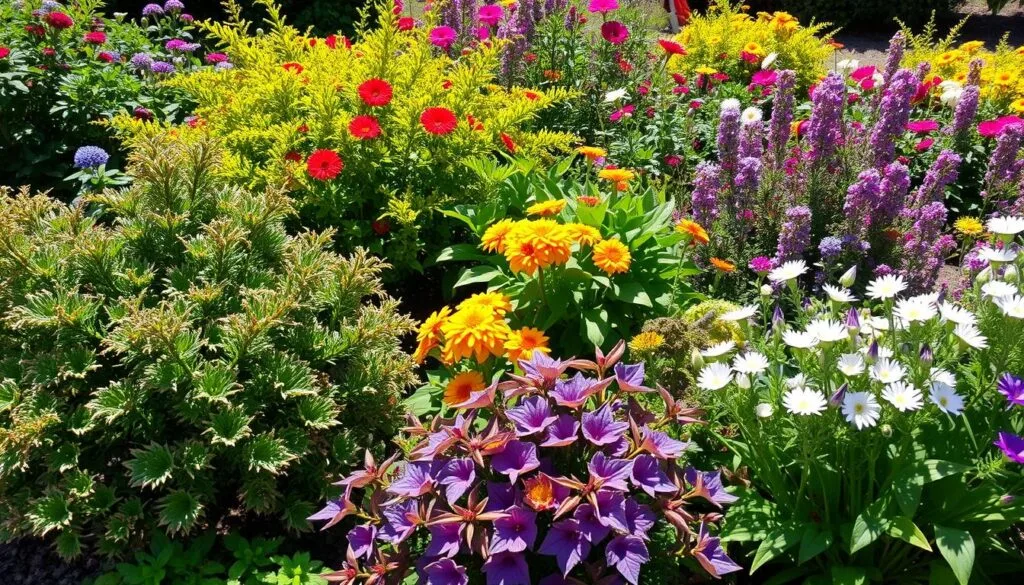
| Shrub/Perennial | Rabbit Resistance | Growth Habit | Maintenance Level |
|---|---|---|---|
| Boxwood | High | Compact, Evergreen | Low |
| Forsythia | High | Sprawling, Deciduous | Medium |
| Russian Sage | High | Upright, Perennial | Low |
| Lavender | High | Mounded, Perennial | Low |
| Catmint | High | Spreading, Perennial | Low |
Native Plant Species That Resist Rabbit Damage
Using native plants in your garden can be a smart move. These plants have natural defenses that rabbits find unappealing. This keeps your garden looking great without worrying about rabbit damage.
Regional Recommendations
The best plants to resist rabbit damage vary by location. In the Midwest, Echinacea purpurea (purple coneflower) and Asclepias tuberosa (butterfly weed) are good choices. On the West Coast, Arctostaphylos (manzanita) and Ceanothus (California lilac) are also effective.
Adaptation Benefits
Native plants have evolved to resist local wildlife, including rabbits. They may have tough textures, strong smells, or even toxins. Adding these plants to your garden helps create a balanced ecosystem.
Seasonal Performance
Native plants are great because they do well all year. They stay rabbit-resistant in spring and summer, when rabbits are most active. This means your garden stays safe no matter the season.
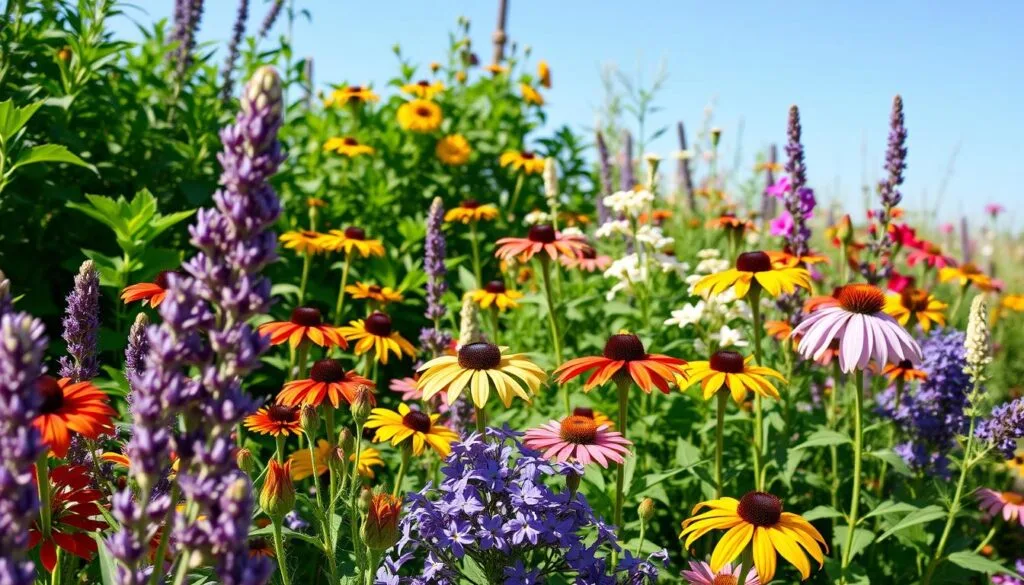
“Incorporating native plant species into your garden is a smart and sustainable way to create an animal-proof landscape that thrives year-round.”
Combining Plants for Maximum Garden Protection
As avid gardeners, we face a constant battle to keep our plants safe from rabbits. But, by mixing different rabbit resistant plants, we can make a safe garden haven.
Layering plants with unique traits can build a strong defense. For example, pairing herbs like lavender or rosemary with prickly shrubs makes a strong barrier. This barrier keeps rabbits away.
- Aromatic plants can hide the scent of other plants, keeping rabbits away.
- Thorny plants, like barberry or yucca, stop rabbits from getting to your plants.
Place rabbit resistant plants all over your garden for better garden protection. A mix of plants makes your garden look good and keeps it safe from rabbits.
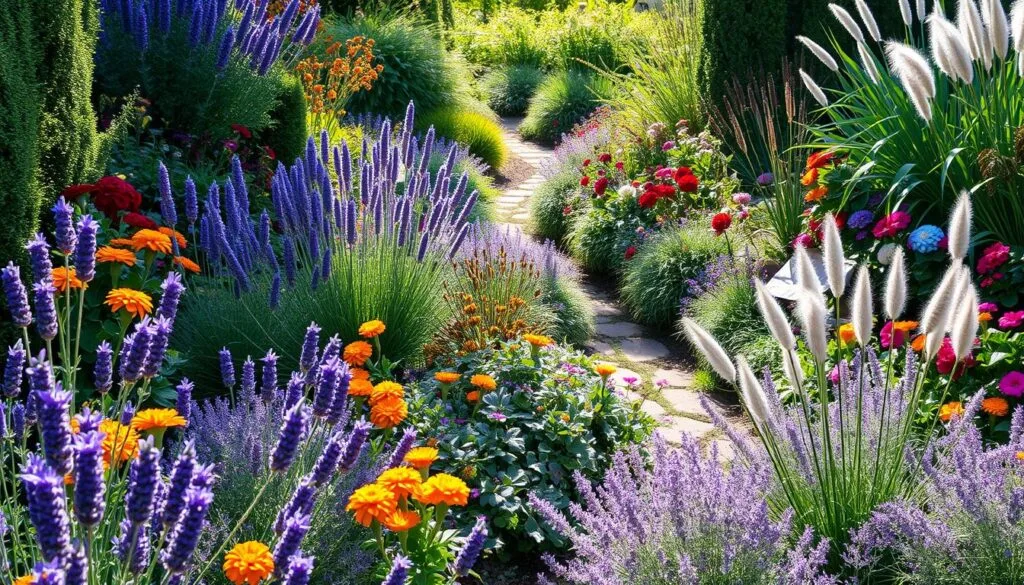
“A well-designed, rabbit resistant garden is not only a joy to behold but also a sanctuary for your cherished plants.”
To protect your garden well, think about how different rabbit resistant plants work together. This way, you can have a beautiful garden that rabbits won’t bother.
Maintenance Tips for Rabbit Resistant Gardens
To keep a rabbit-resistant garden in top shape, you need a mix of care and attention. This ensures your plants stay healthy and look great. Follow these tips for each season and learn how to prune to keep your garden safe from rabbits.
Seasonal Care Guidelines
In spring, it’s time to refresh your garden. Cut back any plants that were damaged over winter. Also, remove any dead leaves and add organic mulch to fight weeds and keep the soil moist.
This is a good chance to check on your plants’ health. You might need to replace some or add new ones to keep rabbits away.
Pruning and Upkeep Strategies
Pruning is key to keeping your plants looking good and growing strong. Trim any branches that are too long or out of shape. This is especially important for shrubs and grasses.
Also, remove any dead flowers to help your plants keep blooming. This stops them from spreading seeds everywhere. By doing these simple tasks, your garden will stay beautiful and keep rabbits out.


